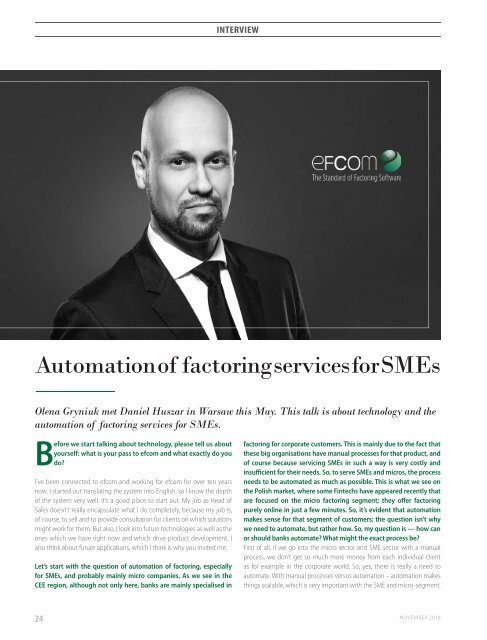SBM magazine / 11-2018
business / banking / SME Banking Club
business / banking / SME Banking Club
You also want an ePaper? Increase the reach of your titles
YUMPU automatically turns print PDFs into web optimized ePapers that Google loves.
INTERVIEW<br />
Automation of factoring services for SMEs<br />
Olena Gryniuk met Daniel Huszar in Warsaw this May. This talk is about technology and the<br />
automation of factoring services for SMEs.<br />
Before we start talking about technology, please tell us about<br />
yourself: what is your pass to efcom and what exactly do you<br />
do?<br />
I’ve been connected to efcom and working for efcom for over ten years<br />
now. I started out translating the system into English, so I know the depth<br />
of the system very well. It’s a good place to start out. My job as Head of<br />
Sales doesn’t really encapsulate what I do completely, because my job is,<br />
of course, to sell and to provide consultation for clients on which solutions<br />
might work for them. But also, I look into future technologies as well as the<br />
ones which we have right now and which drive product development. I<br />
also think about future applications, which I think is why you invited me.<br />
Let’s start with the question of automation of factoring, especially<br />
for SMEs, and probably mainly micro companies. As we see in the<br />
CEE region, although not only here, banks are mainly specialised in<br />
factoring for corporate customers. This is mainly due to the fact that<br />
these big organisations have manual processes for that product, and<br />
of course because servicing SMEs in such a way is very costly and<br />
insufficient for their needs. So, to serve SMEs and micros, the process<br />
needs to be automated as much as possible. This is what we see on<br />
the Polish market, where some Fintechs have appeared recently that<br />
are focused on the micro factoring segment; they offer factoring<br />
purely online in just a few minutes. So, it’s evident that automation<br />
makes sense for that segment of customers; the question isn’t why<br />
we need to automate, but rather how. So, my question is — how can<br />
or should banks automate? What might the exact process be?<br />
First of all, if we go into the micro sector and SME sector with a manual<br />
process, we don’t get so much more money from each individual client<br />
as for example in the corporate world. So, yes, there is really a need to<br />
automate. With manual processes versus automation – automation makes<br />
things scalable, which is very important with the SME and micro-segment.<br />
24<br />
NOVEMBER <strong>2018</strong>
















